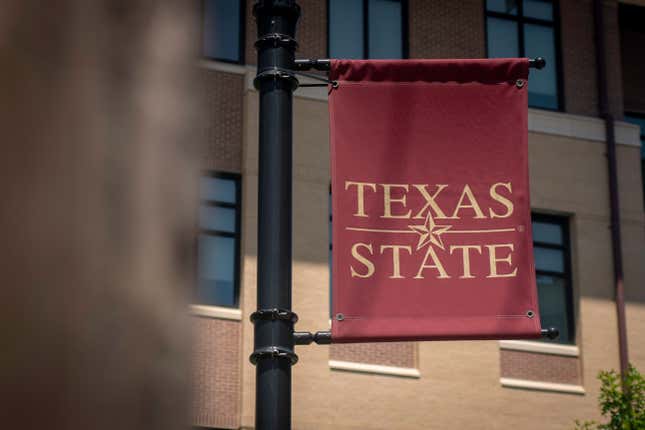
Nothing says “I’m not racist,” like signing an executive order that threatens to cut federal funding for universities unless they stop diversity training, and y’all already know that’s exactly what the president did.
The Texas Tribune reports that Texas State University announced it will freeze its diversity training program as it tries to make sense of the president’s executive order. The order places a ban on training that is “divisive” and “anti-American.” The university’s faculty and staff members were informed of the change in an Oct. 5 email from President Denise Trauth.
“Texas State University receives federal dollars in various capacities including to support pre-college students ... college students via Pell [grants], and our faculty via scores of federal grants,” Trauth wrote.“ We do not want to jeopardize this critical financial support that so many in our community rely upon.”
In a follow-up email, Trauth wrote that students at the university received over $260 million in federal financial aid this year alone. Prior to the order, Texas State provided year-round diversity training to faculty that included conversations around microaggressions and unconscious bias.
Other universities in Texas, such as University of Texas at Austin and Texas Tech, are reviewing the order to ensure they’re in compliance, but they have not suspended their diversity training programs. On a national level, the University of Iowa has also suspended its diversity training as a result of the order.
From the Texas Tribune:
Trump’s executive order, signed on Sept. 22, requires federal contractors and agencies that receive federal grants to discontinue training that contains “any form of race or sex stereotyping” and other “divisive concepts,” which could include discussions of the existence of white supremacy.
“This ideology is rooted in the pernicious and false belief that America is an irredeemably racist and sexist country; that some people, simply on account of their race or sex, are oppressors; and that racial and sexual identities are more important than our common status as human beings and Americans,” the order reads.
The order doesn’t go into effect until Nov. 21, a few weeks after the presidential election. Agencies that don’t comply may risk losing federal funding, but the vague language of the order is making it hard for universities to determine what is and isn’t allowed.
“It’s kind of hard to understand broad definitions like that refer to things like divisive concepts ... does that mean that there cannot be training about implicit bias or unconscious bias?” Lynn Crossett, a law professor at Texas State, told the Tribune. “That seems to be what the order is designed to try to prohibit.”
The Office of Federal Contract Compliance Programs issued a clarification on the order, saying that federal funding could be withheld if it’s found an organization’s diversity training engages in “race or sex scapegoating.”
What is race or sex scapegoating, you ask?
The OFCCP describes it as “assigning fault, blame, or bias to a race or sex, or to members of a race or sex, because of their race or sex. It encompasses any claim that, consciously or unconsciously, and by virtue of their race or sex, members of any race are inherently racist or are inherently inclined to oppress others.”
So, even though white people have, historically, committed mass genocide against the Natives, enslaved Black people for hundreds of years, engaged in lynching, redlining, and the prolonged weaponizing of policy to uphold the values of white supremacy, we can’t go “Hey. Y’all are kinda inherently racist.”
According to the federal government, that makes us the real racists.
University of Houston Law Professor Daniel Morales puts it best. “For this order to now say … that anything else beyond colorblindness is in fact discriminatory toward whites is really to deny reality and stifle racial progress,” Morales told the Tribune. Morales said the order is only the latest attempt by the Trump administration to stifle academic discussions around race.
Students at Texas State are understandably upset that both the training is suspended, and that the university neglected to inform them of the change. Corey F. Benbow, a graduate student at Texas State and president of the Underrepresented Student Advisory Council, told the Tribune that he found the move to be disheartening.
For Benbow, it’s yet another questionable move by the university following their failure to denounce white supremacist propaganda on campus and arresting students of color last year during a protest.
“This is why diversity programs and this type of training is so important, because it provokes thought and it allows the administration to really embed in their faculty and staff that this is something that is important to Texas State,” Benbow told the Tribune,
“As a student who is, you know, queer, I would want to know that my professors or the staff that I engage with aren’t being trained right at that moment,” Maya Diaz, a Texas State psychology sophomore, told the Tribune.
Morales told the Tribune that students shouldn’t be worried about the long-term effects of the order as it’s likely to be challenged on First Amendment grounds. Also, given that we have an election in three weeks, the order could be reciscended should a new president be voted into office.
Still, for Benbow, the hope of legal action or a new presidency isn’t enough to reverse the damage already done by the university.
“This is a predominantly white university that was never built for myself to get an education or for students of color to get an education,” Benbow told the Tribune. “When we have these systems in place that have been oppressive, depressive and suppressive, it is incumbent upon us to do something about it.”

